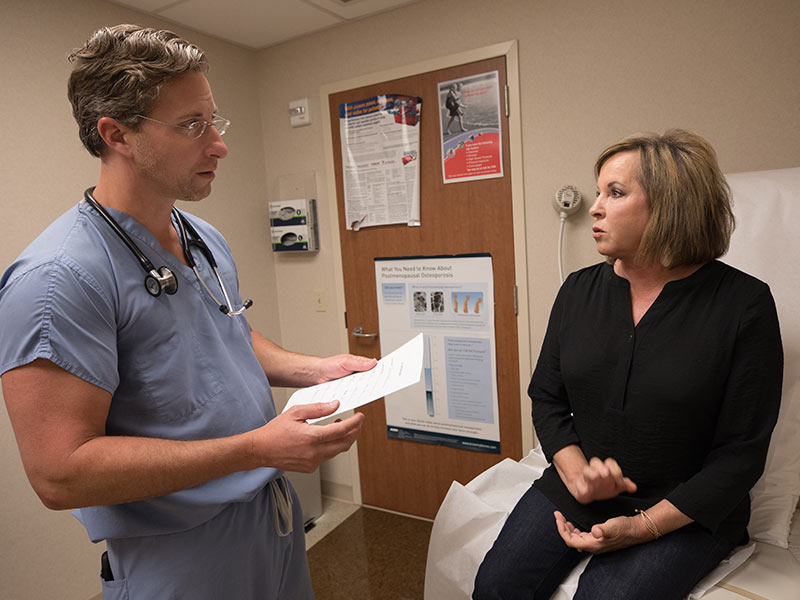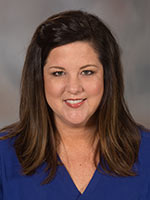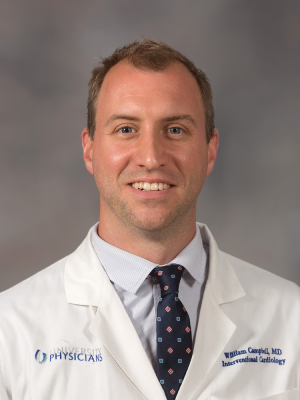STEMI receiving center ensures swift care for heart attack patients

All Kim Moore wanted was to get her nagging pain fixed.
“I suffered for six weeks. I thought I had an ulcer,” the Flowood resident said.
But when her discomfort escalated, she called her daughter, Deanna Chambers, a nurse educator in the University of Mississippi Medical Center’s cardiovascular ICU. Chambers quickly realized her mom’s problems could be heart-related, and told her just that.
“I said, ‘I’m not having a heart attack,’” Moore remembered of the morning of June 1. Even so, she followed her daughter’s wishes and let her at least take her to get an EKG at a minor medical clinic. “Deanna looked at me and said, ‘Mama, you’re having a heart attack.’

“She’d had ulcers before. She thought it was acting up,” Chambers said of her 59-year-old mom. “But when she called me that morning, she was short of breath and anxious, and said the pain wasn’t going away. She said she had pain going down her arm.
“When they hooked her to the EKG, I could see it. I said to call for an ambulance and take her to UMMC.”
“They did an EKG in the ambulance, and they told me at the emergency room that I was having a heart attack,” Moore said. “They knew that I was having a heart attack, and that I was blocked.”
Before she could even finish getting her mom checked in, Chambers said, “they were rolling her back to the catheterization lab. They kept me updated on what was happening. They did what they had to do.”
Moore was suffering what’s called a STEMI. Short for ST-Elevation Myocardial Infarction, it’s a profound medical emergency in which one of the heart’s major arteries is blocked, depriving the heart muscle of oxygen and blood. Victims need to quickly reach an emergency room equipped to save them, and they sometimes need cardiopulmonary resuscitation and defibrillation of the heart muscle to shock it into a normal rhythm.
UMMC, the state’s only Level I Trauma Center designated by the state Department of Health, has long been recognized for its success in treating the sickest of the sick, including those who have suffered a heart attack or stroke. The Medical Center has received yet another accolade: It’s been recognized by the Health Department as a STEMI Receiving Center for its expertise in that emergency care.

“There are very few things that are as time sensitive as STEMI care,” said Dr. William Campbell, UMMC associate professor of cardiology. “There are a lot of moving parts that must run efficiently.”
That can include first responders notifying Mississippi MED-COM, the statewide medical emergency communications system housed at UMMC, that a patient is en route by ambulance, including those referred from smaller hospitals with fewer resources, or being transported to the Medical Center via AirCare, UMMC’s medical helicopter transport. All receive swift treatment in the Emergency Department and the catheterization laboratory.
UMMC has in place technology to streamline the STEMI care process, including a cell phone-based alert system that uses an app to enable doctors to review a patient’s EKG taken before arrival at the ED, and to offer help to EMS staff as needed. “If they can activate this when they pick up the patient, we can have the cath lab ready for them when they arrive,” Campbell said.
That system came into play immediately after Moore’s first EKG revealed the problem.
“They walked me through every step, and told me that they were going to catheter (my artery),” Moore said of her care once she arrived at UMMC’s Emergency Department. “I thought they would let me go home, but they made me stay. They knew I was having a heart attack, and they went in and treated it.”
STEMI patients also receive care on the Medical Center campus at University Heart, which provides comprehensive services for adult heart disease. University Heart’s team of cardiothoracic and vascular surgeons, electrophysiologists, and interventional cardiologists work together to develop better ways to treat and manage heart disease at any stage.
The Receiving Center designation recognizes that UMMC follows standardized Health Department protocols for treatment of STEMIs, said Melissa Stampley, clinical outcomes coordinator for University Heart and STEMI regional coordinator for the Mississippi Healthcare Alliance’s Central Region.
The Health Department’s protocols are detailed in its STEMI System of Care Plan.
Receiving Centers must be equipped to perform percutaneous coronary intervention with placement of stents or balloons in the coronary artery to expand it. They also must have a cardiologist on duty 24/7, and must always accept STEMI and stroke patients, Stampley said.
Receiving Centers also must provide leadership and complete care for every aspect of STEMI, from prevention to rehabilitation, the STEMI System of Care Plan says.
UMMC representatives serving on the Health Department’s STEMI Advisory Committee include Dr. Richard Summers, professor of emergency medicine and associate vice chancellor for research, co-chairman; Dr. Harper Stone, affiliate faculty, co-chairman; Stampley, Central Region nursing representative; and Donna Norris, clinical director of Mississippi Med-Com, Central Region EMS provider representative.
UMMC is uniquely qualified to receive and care for STEMI patients. “We are a 700-bed diagnostic and treatment referral center,” said Campbell, UMMC and central region cardiologist representative on the state STEMI Performance Improvement Committee.
“We have 30,000 annual hospital admissions” and more than 143,000 annual Emergency Department visits, he said. “We have some tools in our toolbox that aren’t available in other places. We have the only interventional cardiology fellowship program in the state, and we have 24-hour, 365-days-a-year surgical backup. We are the only transplant center in the state, and one of the few places that do extracorporeal membrane oxygenation (ECMO).”
Moore is grateful for her care, including that from her University Heart cardiologist, Dr. John Winscott, associate professor of cardiology. “I’ve got to stay on a blood thinner for a year, and I’ve got to go back for an EKG every four months,” she said.
Her mom’s experience is a cautionary tale, Chambers said. She urges women to take the time to get checked, and not to think that they’re too young for a heart attack, or that maybe it’s just indigestion. “Sometimes, denial is the problem. You don’t want it to be something else,” Chambers said.
“We have a chest pain unit at UMMC where even if they’re not sure, they will keep you overnight and watch you. It’s not something anyone plays around with.”


